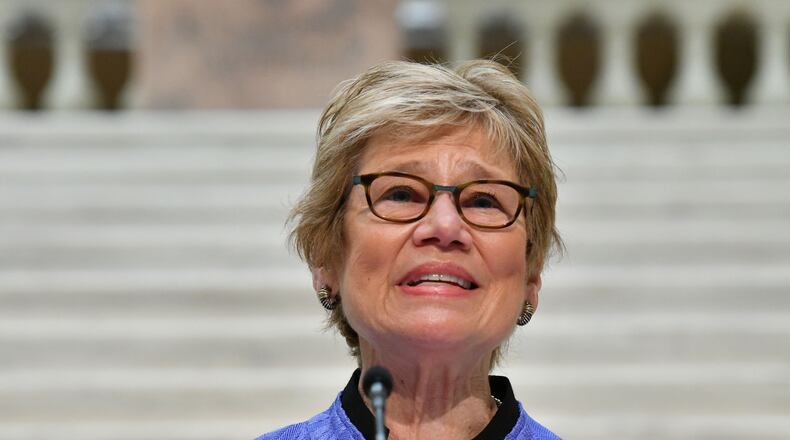The number of cases of the new U.K. variant of COVID-19 in Georgia has risen to 13, according to the state’s lead health official, who said the rise means it’s more important than ever that the state efficiently rolls out vaccinations.
Speaking over video conference during a virtual COVID-19 summit hosted by Gwinnett Cares on Wednesday morning, Kathleen Toomey, commissioner of the Georgia Department of Public Health, warned the variant is more contagious and possibly more deadly than the original strain of the virus. The number of cases apparently rose from six cases reported in Georgia yesterday.
The state Department of Public Health, which has been tracking the new variant, has refused to say which cities or counties in Georgia have had people infected. The department contends revealing that could lead to discovery of the names of patients, violating their privacy rights.
Known as B.1.1.7, the U.K. strain is believed to be 50% to 70% more contagious and 30% deadlier than the common SARS-CoV-2 virus, according to British health officials.
The spread of the new variant gives new urgency to the rush to vaccine the most vulnerable. Pfizer-BioNTech and Moderna vaccines currently administered require two doses, but Georgia residents are struggling to receive a second dose within the suggested time frame of three to four weeks after their first dose. Because of this, the state is prioritizing giving out second doses rather than first doses, Toomey said Wednesday.
The difficulties in getting an appointment for a vaccine continues and Toomey said the shortfall may not improve soon. Georgia is currently only allocated 120,000 first doses and 80,000 second doses per week, which is “very little when you consider a state with a population as large as ours,” she said.
The state has failed to make a dent in the nearly 2 million people eligible to receive a vaccine, as it struggles to provide doses to vaccination sites, Toomey said. The approximately 1,900 vaccine providers have received nearly 2.6 million requests for vaccinations, with only about 230,000 doses they could administer, she said.
Vaccines are currently available to health care workers, residents and staff of long-term care facilities, law enforcement, firefighters, first responders and adults ages 65 years or older.
As schools reopen across the state, teachers have pushed to be included in this group, but this likely won’t happen because of the limited vaccine doses available, Toomey said.
Given the guidance from the Centers for Disease Control and Prevention that schools can reopen safely with masks and social distancing, Toomey voiced her support for the state’s decision to first vaccinate elderly residents.
But even as Georgia residents scramble to book a vaccine appointment, not everyone who is eligible wants one. Toomey reported that only about 35% of staff in long-term care facilities and less than 50% of hospital staff have been vaccinated, and she said younger people in general appear more hesitant to take the vaccine compared to older age groups.
“That’s a challenge for us that if providers themselves or staff and nurses in hospitals don’t feel comfortable enough to get the vaccination, then it sends a message to the rest of the state,” said Toomey, later adding that any unused doses would not go to waste and be saved for future use.
Audrey Arona, district health director of the Gwinnett, Newton and Rockdale County Health Departments, said Georgia is working on developing a centralized system for people to use to sign up for vaccines. The systems used in other states have encountered issues, she said, and it wouldn’t be available until the state is able to adequately vaccinate individuals.
As of yesterday, her health departments administered 18,000 vaccines since they were deployed last month.
The number of COVID-19 cases requiring hospitalization in the three-county district has dropped to 6% of all confirmed cases. The total number of cases is four times higher than in November 2020. This has led to a shortage of ICU beds and ventilators in local hospitals, Arona said.
Carlton Buchanan, chairman of Gwinnett Emergency Specialists at Northside Hospital Gwinnett and Duluth, said metro Atlanta hospitals are facing a larger COVID-19 surge than the one in summer 2020. He said he’s concerned about hospitals needing to divert emergency patients and shortages of beds in intensive care units. He also said he was concerned about the need to optimize the early care of high-risk patients to improve their outcomes.
When someone contracts the disease, Buchanan said individuals should notify their primary care physician, take over-the-counter medications like Advil or Tylenol, avoid sleeping on their backs and monitor their blood oxygen levels with a pulse oximeter.
About the Author
The Latest
Featured



